Wearing contact lenses offers many advantages, but in order to maintain healthy contact lens wear for years, follow these 7 simple tips for wearing contact lenses safely.
I am not a doctor. The information provided on this page is for general educational purposes only. You are not receiving medical advice or being given a diagnosis on this site. Please read Contacts Advice Terms of Use before continuing.
1. Don’t handle your contact lenses with dirty hands
By dirty, I don’t mean hands that are covered in mud and dirt. I mean hands that weren’t properly washed immediately before handling your contact lenses. The most dangerous you can expose your contact lenses to bacteria, and since you can’t see bacteria, you have to assume that you have some on your hands unless you just finished washing them.
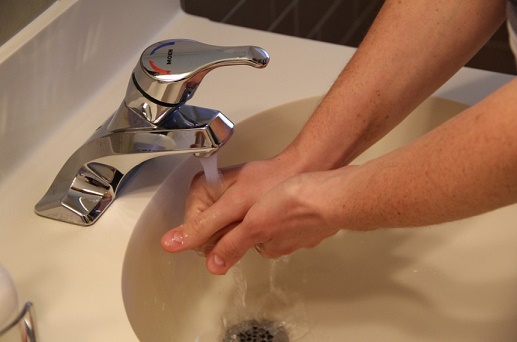
If you washed your hands but decided to pull out your phone and reply to a text message before taking out your contact lenses, you would be best to wash your hands again.
2. Clean your contact lenses as intended
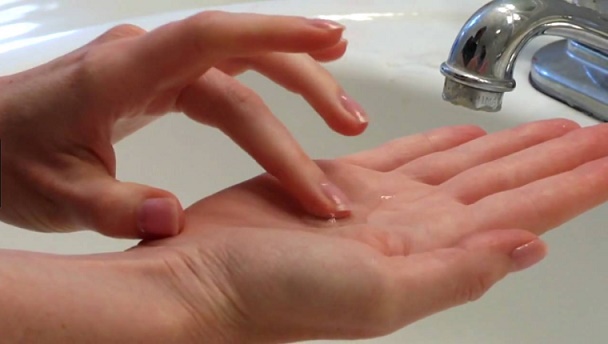
Your contact lenses spend all day on your eyes, picking up and absorbing anything that floats in your tears or gets into your eyes. By the time you take them out, they will be covered with debris and deposits from your tears.
At the end of a long day for the busy/lazy individual, there’s nothing they feel like doing less than spending 5 minutes on their contact lens care routine. So instead of rubbing and rinsing their contact lenses properly, they remove their lenses and plop them into days old solution and tell themselves that they’ll do a proper cleaning the next day.
Not using fresh contact lens solution every day will drastically affect your risk of contracting a serious bacterial eye infection.
Not rubbing your lenses with contact lens solution for the proper amount of time will cause deposits to build up on your contact lenses making them unbearably uncomfortable days or even weeks before they are due to be replaced.
3. Never Substitute contact lens solution with water
Most of us would never do such a thing, but when you are caught in a bad situation, you might find yourself seriously considering it.
People will resort to this kind of thing when they end up spending the night somewhere they don’t have access to contact lens cleaning solution. They figure that if they put their contact lenses in water, they might not get cleaned, but at least they will stay hydrated.

What they don’t anticipate is the possibility of seriously contaminating their contact lenses with a microscopic parasite known as Acanthamoeba. You may be surprised to know that is it not uncommon for Acanthamoeba to be present in your tap and shower water. If this water is used to store your contact lenses and you’re one of the unlucky ones who’s eyes get directly exposed to Acanthamoeba, you will contract one of the most serious and hardest to treat eye infections out there, known as Acanthamoeba keratitis.
With Acanthamoeba keratitis, the chance that you will sustain permanent vision loss is high. You may even completely lose vision in the affected eye.
Admittedly, the risk of capturing Acanthamoeba in a contact lens case sized container is small, but how much risk are you willing to take with your vision?
The best thing to do when you find yourself in this unfortunate situations is to discard your contact lenses.
If you’re wearing a fresh pair of (monthly) contacts and you can’t afford to lose a whole month’s worth of lenses, it would actually be favorable to sleep in your contact lenses for that night (only) than to store them in tap water.
4. Avoid Repositioning your contact lenses with your fingers
People who wear contact lenses for astigmatism know how annoying it can be when their contact lenses rotate out of position. You can feel the lenses spinning on your eyes and suddenly everything becomes blurry.
For some people, this happens so often that they’ve developed a habit of using their fingers to quickly push the lenses back into position. Although this may restore clear vision in the short term, it will lead to problems for your eyes in the long term.
The main problem with this comes from touching your eyes with dirty fingers. There is no better way of transferring bacteria to your eyes than to touch them with your fingers. Throughout the day your fingers are constantly picking up bacteria from all of the things you touch. Sticking those dirty fingers into your eyes to reposition your contact lenses is a dangerous game.

The second problem with doing this is the physical irritation that you are causing to your eyes. The more you manipulate your eyes, the more you increase your risk of scrapes and scratches on your eyes. This can result in extreme discomfort, prolonged redness, and a very high-risk secondary infections.
If your contact lenses are constantly falling out of position, the best thing you can do is book an appointment with your optometrist for a contact lens refitting. Your optometrist will adjust the parameters of your contacts to prevent them from shifting and spinning on your eyes. If need be, you may be refit into a different contact lens brand.
5. Avoid swimming with contact lenses

Swimming is a tempting activity to do while wearing contact lenses. For some, one of the main reasons for getting contact lenses is to not have to wear glasses at the beach and by the pool. However, swimming with contact lenses is generally not recommended.
Why?
Because in increases your risk of eye infection through exposure to bacteria and other microorganisms in the water. Contact lenses are particularly good at absorbing water, as well as all the microscopic things living in said water. Once bacteria have entered your contact lenses, they find themselves in the perfect environment to reproduce and multiply. Eventually, they will transfer over onto your eye and cause havoc.
If you are intent on swimming with contact lenses, it would be to your advantage to use daily disposable contact lenses. These contact lenses are discarded daily, hence hey don’t allow enough time for any potential bacteria caught in your contacts to multiply to numbers that would cause an eye infection. To be on the safe side, it is best to change your contact lenses immediately after swimming in them.
6. Avoid sleeping with contact lenses

Sleeping with your contact lenses is not recommended as it tends to cause dryness and discomfort in your eyes, and if done regularly, can lead to more serious issues such as corneal hypoxia (cornea not receiving enough oxygen), corneal infiltrates, contact lens associated red eye, etc.
What may seem contrary to this advice is the fact that many common brands of monthly contact lenses are approved for overnight wear, some for up to 30 days. These brands include Air Optix Night & Day, Air Optix Aqua, Biofinity, PureVision 2, Acuvue Oasys, etc.
However, a contact lens approved for overnight wear by a regulatory body such as the FDA or Health Canada is different from your eye doctor approving you for overnight contact lens wear.
In short, you should avoid sleeping with your contact lenses as much as possible unless you were specifically approved by your optometrist for such wear.
7. Avoid extending the life of contact lenses

Wearing contact lenses beyond their designated life span is common among young contact lens wearers who want to save money on contact lenses. By wearing their lenses longer than they’re supposed to, they delay the need to spend money on re-ordering more contact lenses.
Younger people tend to be more guilty of this for 2 reasons.
-
- Younger eyes are more resilient to negative effects of stretching out contact lenses. They don’t feel that anything is wrong when they were their monthly lenses for 5 or 6 weeks, so they make a habit of it. The issue with this is that their eyes will rapidly accumulate the effects of their bad habit and lead to early contact lens intolerance.
- Young contact lens wearers in their early twenties tend to make less money those in their late thirties or forties. Spending hundreds of dollars a year is not something a lot of people want to do, especially if they’re already head deep in student loans and other types of debt.
Following the tips for wearing contact lenses above will help you be successful with your contact lenses and wearing them for many years to come.
A lifetime worth of contact lens wearing can add up to several thousands of dollars. That is a significant investment that can also be a big waste if you are overpaying for your contact lenses.
Are you overpaying for contact lenses?
If you feel that contact lenses are too expensive, I don’t think anybody would disagree with you. But did you know that there is a way to save money on contact lenses that you’re probably not taking advantage of?
The vast majority of contact lens wearers have no idea where to find the lowest price for their brand of contact lenses, and consequently, they end up overpaying. Depending on your brand and how many boxes you order, you could easily be overpaying by hundreds of dollars!
Contact lens price comparison sites can save you hundreds!
To avoid this costly mistake, it is crucial that you consult a contact lens price comparison website before you purchase your contact lenses.
Contacts Advice is the Internet’s leading contact lens price comparison site. I personally do price checks for over 50 brands at the 11 leading contact lens websites (that’s over 550 price checks) to uncover where the best price for every brand can be found.

To find the lowest price for your brand, simply consult the comprehensive contact lens price comparison chart of Contacts Advice’s homepage.
I also consider things like shipping & handling and processing fees to make sure that you’re not hit with any surprise fees that could increase the cost of your lenses. I also consider volume discounts so that you can find the best price for your lenses no matter how many boxes you plan to order.
For a thorough investigation of where the best place to shop for your specific brand is, including a complete 20 site comparison taking into account all factors that influence the final price, simply:
You can message me on Facebook, or in the comments below.

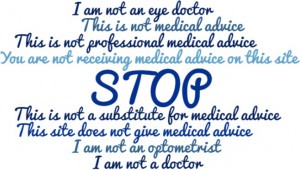


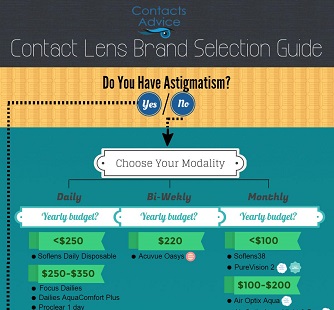
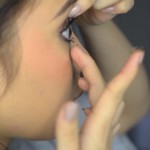
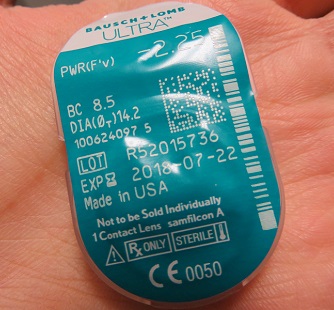
2 Responses
Barbera Peters
My sister and I both wear glasses but she has decided to start wearing contact lenses. I wanted to see what I would need to know for myself if I decided to wear them as well. You said that it is important to avoid sleeping with contact lenses in as it could cause dryness and eye discomfort. That is a great tip for me to keep in mind as well as tell my sister so that she can be safe.
Ashley Turns
I’m planning on getting myself some contact lenses since I’ve worn glasses the majority of my life. So thank you for telling me that swimming while wearing them means I’m more exposed to bacteria and more at-risk to get an eye infection. Once I receive my contact lenses, I’ll be sure to avoid swimming with them so I don’t have to worry about microorganisms giving me an infection.